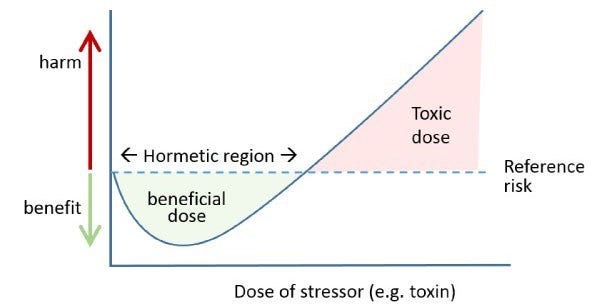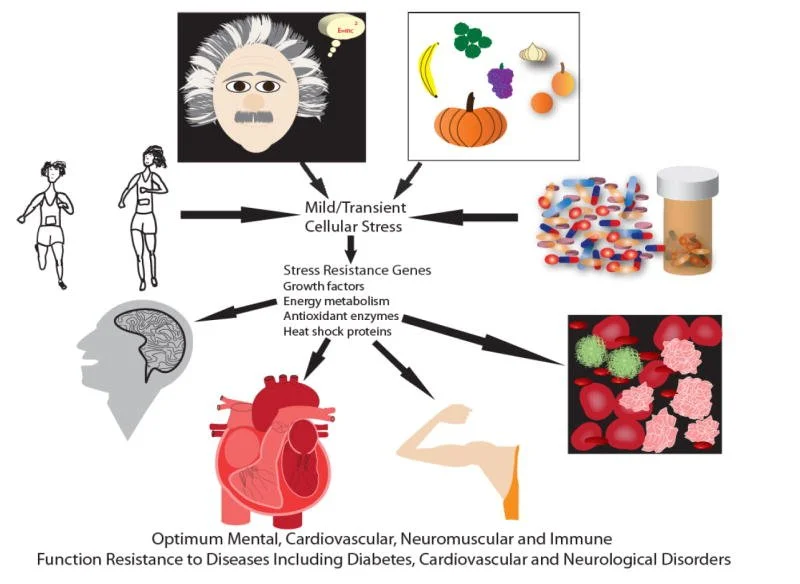The Upside of Stress.
Stress can be incredibly beneficial for us. In fact, it’s a critical part of our evolution, and intermittent or low-grade stress is a powerful and effective way to increase strength, resilience and longevity.

is a term used to describe the bi-phasic dose response to an environmental agent. The first phase is a positive/beneficial effect and the second phase being a progressively negative/toxic effect.
HIIT (high intensity interval training), short-term caloric restriction/ intermittent fasting, weight bearing exercise (for building bone mass) and periodic exposure to cold temperatures/ water are all examples of hormesis in action. There are many more examples but these are some of the obvious ones.
Initially, the body responds to these ‘stressors’ or challenges by increasing free radical production and energy demands, and influencing things called ion fluxes. Then, the body responds by up-regulating many pathways that actually protect cells against more severe stress (these include growth factors, antioxidants, and proteins involved in energy metabolism and cellular calcium homeostasis/balance).
It’s a way of teaching the body and mind how to be stronger and more resilient, so that the next time it encounters an even greater challenge, it has the hardware and know-how to deal with it effectively.
For example, when we ‘stress’ our bones through weight bearing exercise regularly and build bone density, we’re enhancing our capacity to resist injury if we happen to fall. When we ‘stress’ our muscles by doing weight bearing exercise and grow stronger, we’re preparing ourselves for the likely event of having to move something really heavy one day (which might just save our life!). When we expose ourselves to ice baths, we’re enhancing our capacity to deal with extreme environmental weather events that might be just around the corner.
And when we eat a diverse range of foods with different phytochemical and biochemical properties, we’re teaching our bodies about the environment around us, and activating cellular stress response pathways that are incredibly beneficial.
HOW PLANTS CHALLENGE, YET PROTECT US.
Phytochemicals are biologically active compounds found in plants (also called secondary metabolites/compounds). They are responsible for the heat in chilli, the bitterness in cacao, the volatile oils in rosemary, and golden pigment in turmeric. There are literally thousands upon thousands of phytochemicals present in plants.
Phytochemicals are the chemical defense mechanism that plants use to dissuade insects and other herbivores from eating them. Most phytochemicals are present in relatively low levels in plants, and the co-evolution of plants and animals enabled adaptation of animals to these otherwise potentially toxic substances.
There is strong evidence to suggest that consumption of a phytochemical-rich diet reduces the risk of many chronic human illnesses such as cancer, heart and neuro-degenerative diseases.
What's interesting however, is that in regards to our health, the benefits of phytochemicals extend FAR beyond their antioxidant actions. Instead of just scavenging free radicals and acting as antioxidants, it seems that phytochemicals activate cellular stress response pathways, and promote wellness primarily through hormesis.
Take note however, theconcentration of the phytochemicals produced are influenced directly by the environmental conditions — which changes day to day, season to season, year to year. This means that biochemically, as Prof. Fred Provenza (author of Nourishment) states in his book, there are no two foods alike (or animals for that matter), and nor should there be. If that’s not a beautiful example of uniqueness I don’t know what is!
Of course, if we were to overdose on certain plant-based compounds (like caffeine or bitters), experience prolonged bone/muscular loading without rest, or fast for too long… the benefits decline and the risks go up.
The big takeaway for me is that stress isn’t “good” or “bad” — it can be both. And as always, it’s all about balance!


